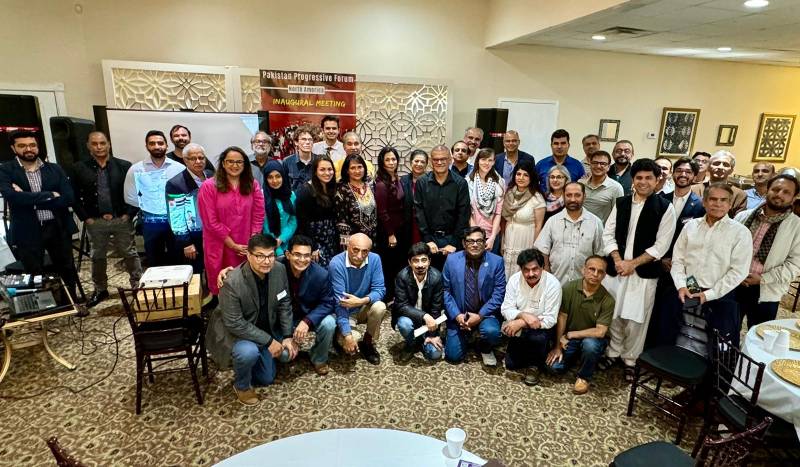
Progressive Pakistanis in the United States can be a catalyst in advancing social justice, equality and social movements in North America and Pakistan. A day long moot of the Pakistan Progressive Forum (PPF) held in Houston, Texas in November 2023 resolved to organize and coalesce professionals, academics, activists around a common agenda for action.
The meeting was co-organized by Dr. Amir, Dr. Zaffar Iqbal and Dr. Haider Afzal, with a view to taking stock of critical issues facing Pakistan and expatriates abroad. More than 70 Americans of Pakistani origin gathered and shared their views on creating a vibrant forum for community engagement, learning and action. Dr. Ammar Ali Jan, an academic, political organizer and young leader from the political left in Pakistan, was a special guest at the occasion. In addition, Seth Uzman from Jewish Voices of Peace and Parvez Agwan also spoke at the ceremony.
Opening the session, journalist and professor Raza Rumi, who was also the moderator of the event, highlighted the importance of the diaspora in remitting ideas and knowledge back ‘home’ and the need to for supporting progressive causes in America as well as Pakistan. Rumi stressed that there was a need to lay out an organizing strategy and to aim for specificity in devising a realistic agenda for action.
Dr. Ammar Ali Jan spoke about the conditions in Pakistan and how the youth, women and progressive social movements were challenging the status quo, as well as creating new avenues for political action. Dr. Jan narrated his efforts to engage with electoral politics through his party Haqooq-e-Khalq Movement. Despite the odds, HKP has set up subsidized health service outlets and motivated the communities to claim their basic rights.
Dr. Taimur Rehman, who heads the Mazdoor Kissan Party and is a member of the faculty at Lahore University of Management Sciences joined the event via Zoom. He spoke about the role of the IMF in shaping Pakistan’s domestic policies, which have resulted in economic hardship for the people. Urging support for progressive movements, Rehman called upon the diaspora to unite and create conditions that allow for community action and creating alternative visions for societies in Pakistan and the United States.
Pervaiz Agwan, a candidate for Congress from Houston told the audience that he was trying to bring together a number of communities around a common platform for social change, with a view to rejecting the dominance of special interests.
The organizers Dr. Iqbal, Dr. Raza and Dr. Afzal also spoke at the event and underscored the need for forging a common cause to overcome the tides of right-wing extremism, injustice and bigotry. They emphasized how this required continued engagement, and involving people who may have varied political affiliations and ideologies.
Another progressive professional, Dr. Shagufta, stressed the need to streamline diaspora voices and making them heard both locally and overseas. She added that in coming months, more and more members will be recruited into the PPF.
Dr. Kamran Asdar Ali, head of the anthropology department at University of Texas at Austin, cited the urgent necessity of political action given the dire situation across the globe, especially in Pakistan due to decades of anti-people policies and ascendance of right wing politics. Dr. Ali expressed his support to the forum.
Asad Zaidi from Los Angeles spoke via video link about earlier efforts by progressive academics and activists in 1970s and 1980s to influence the discourse and thinking on politics, society and culture. The archives of a progressive publication were being digitized for reference and for a wider audience in the US and elsewhere. Zaidi was optimistic that with strong organizing the diaspora efforts could bear fruit in the years to come.
The moot decided to hold their next meeting in Chicago during the spring of 2024. It was also decided that a dedicated website and social media platforms will be developed for the PPF and diaspora across different states will be reached out through state wise representatives. Localizing grassroots organizing and advocacy was the way forward, the participants concluded.

